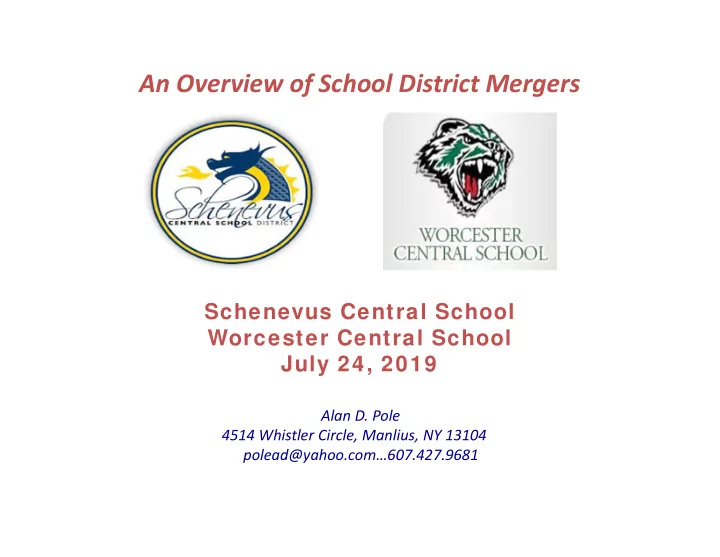

An Overview of School District Mergers Schenevus Central School Worcester Central School July 24, 2019 Alan D. Pole 4514 Whistler Circle, Manlius, NY 13104 polead@yahoo.com…607.427.9681 1
The Perfect Storm There are greater expectations for student performance School districts in New York State are facing significant financial challenges Most school districts across New York State are experiencing student enrollment declines 2006- 2017-18 Difference 07 Schenevus 390 357 -33 (-8.5%) Worcester 440 332 -108 (-24.5%) 2
School District Mergers 3
Why Consider Merger? Increase course offerings for students Teachers teach only in their area of specialization Upgrade facilities and equipment More cost effective administrative structure Eliminate duplication of facilities, equipment, support functions and staff Reduce taxes 4
Why Merger May be Difficult Fear of losing local identity Perception that the communities are incompatible Uncertainty over board representation Less personal attention for students Busing time for students will be increased Fear of losing job security by staff Natural resistance to change 5
Types of Reorganization Centralization-New district created with a new name and a new board of education Annexation-One district takes over the other district with the annexing board of education, administration, policies, CBA’s etc. remaining in place 6
The Merger Study Provides information for school district officials, the communities, and the Commissioner on enrollment projections, student programs, facilities, transportation, staffing, and finances Facilitated by consultants Overseen by school/community advisory committee of 14-18 people Report is the responsibility of the consultants Both Boards of Education decide how to proceed with the final study State funding for studies is uncertain 7
Mergers-What Research Tells Us Curriculum opportunities for students will be enhanced Extra-curricular opportunities for students will be enhanced School buildings will be enhanced Some students will have a longer bus ride Class sizes tend to get larger Tax rates on true value decline School district spending may increase 8
Two Steps in the Merger Process The Study -Conducted by consultants with oversight by a local committee to provide information to the boards, the administration, SED, and the communities The Vote -Overseen by the State Education Department and the District Superintendent, boards sanction an advisory public referendum which, if successful, is followed by a final referendum 9
Potential Time Line September (Year 1)-Boards meet to discuss study November-Committee appointed June-Study completed July-Study reviewed by S.E.D. August-Study presented to boards September (Year 2)-Public information and discussion November-Boards decide to go forward December-Advisory referendum January-Final referendum April-Vote for new board members May-Budget vote July 1-New district begins operation with the new board of education 10
The Finances of Merger-Part 1 Incentive Operating Aid Combined operating/foundation aid (GEN Report-Line 75 for 2006-07 data) for both districts is increased as follows: Year 1-40% Year 6-36% Year 11-16% Year 2-40% Year 7-32% Year 12-12% Year 3-40% Year 8-28% Year 13-8% Year 4-40% Year 9- 24% Year 14-4% Year 5-40% Year 10-20% Year 15-0% 11
12
The Finances of Merger-Part 2 Incentive Building Aid Additional 30% on top of the higher district’s selected building aid ratio up to 95% (98% for high needs districts) for 10 years for any new construction Existing debt is aided at the higher of the previous districts’ selected building aid ratios Selected Building Aid Ratios Schenevus .804 Worcester .808 13
The 1/3, 1/3, 1/3 Guideline for Incentive Operating Aid 1/3 to finance transition costs to the merged district 1/3 in reserves for long term fiscal stability 1/3 to reduce taxes Tax Rates on True Value-2018-19 Schenevus $17.91 Worcester $19.86 14
History of School District Reorganization in New York State Year Number of Districts Decrease 1870 11,372 1890 11,216 156 1910 10,565 651 1930 9,118 1,447 1940 6,397 2,721 1950 3,189 3,208 1960 1,293 1,896 1970 760 533 1980 739 21 1990 720 19 2000 704 16 2010 697 7 15
Questions??? 16
Recommend
More recommend